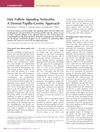Dengue Virus Infects Primary Human Hair Follicle Dermal Papilla Cells
August 2018
in “
Frontiers in Cellular and Infection Microbiology
”
Dengue virus DENV primary human hair follicle dermal papilla cells HFDPCs type I interferon subneutralizing antibodies antibody-dependent enhancement ADE inflammatory response cell death post-dengue fatigue syndrome PDFS immune-privileged tissues hair follicles Dengue hair follicle cells interferon antibodies inflammation fatigue syndrome

TLDR Dengue virus can infect human hair follicle cells and may cause hair loss.
The document describes a study that explored the connection between Dengue virus (DENV) infection and hair loss, focusing on the infection of primary human hair follicle dermal papilla cells (HFDPCs). The researchers found that HFDPCs are susceptible to DENV infection, with infectivity rates of 63% for DENV-1 and 23-40% for DENV-2 at various multiplicities of infection. The study showed that type I interferon treatment could reduce DENV-2 infectivity and that the presence of subneutralizing antibodies could enhance DENV-2 infectivity through antibody-dependent enhancement (ADE). The infection led to an inflammatory response and cell death in HFDPCs, which may explain the hair loss observed during the dengue epidemic. The findings suggest that direct DENV infection of HFDPCs might contribute to post-dengue fatigue syndrome (PDFS), including hair loss, and underscore the importance of further research on the impact of DENV on immune-privileged tissues like hair follicles. The number of people or samples used in the study is not specified in the summary provided.








